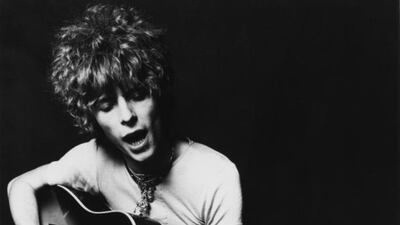Bowie was no stranger to publicity, or controversy, ever since the success of his first hit single, Space Oddity, in 1969. His ever-changing roster of onstage personas – Ziggy Stardust, Aladdin Sane, The Thin White Duke – kept him in the spotlight.
His unashamedly theatrical approach to the role of pop star, coupled with his wilful androgyny in more conservative times and an ever-reliable chain of musical gems meant Bowie was a favourite of both tabloid gossip pages and serious music journalists throughout the 1970s, 1980s and into the 1990s.
In typically obtuse Bowie fashion, the singer became more publicity-shy in later years. Blackstar, his 25th studio album, was released without fanfare, marketing or publicity just two days before his death. This was a low-key approach Bowie had followed with his releases for some time, and while all the logical rules of pop stardom would suggest such refusal to play the game should spell the death knell for a career, such was Bowie's influence that it seemed to merely add to his mystique and bolstered the respect afforded to this bona fide legend.
Bowie was born David Jones in Brixton, London, on January 8, 1947. His early years offered little sign of the musical genius that was taking shape, although his biographer, Christopher Sandford, noted that the youngster’s voice was considered “adequate” by his choir master, while his playing of the recorder demonstrated “above average” musical ability.
Bowie's interest in music was awoken in 1956 when his father brought home a selection of singles from American artists including Little Richard and Elvis Presley. Bowie later said that on first hearing Richard's Tutti Frutti, "I had heard God".
In 1961, Bowie’s mother bought him a plastic alto saxophone and he took lessons from a local musician. However, the 1960s were marked largely by failure, as Bowie performed in a number of bands with little recognition or success. In 1967, he went solo, changing his name to Bowie, in honour of the American frontiersman who invented the famous knife.
He also wanted to avoid being confused with fellow Brit Davy Jones from The Monkees, who were at the peak of their success at the time.
Still success proved elusive. His debut solo single, The Laughing Gnome, sank without trace, and his debut album, David Bowie, met a similar fate.
Bowie took a two-year hiatus from music, during which time, partly inspired by a short-lived relationship with dancer Lindsay Kemp, he began to explore a more theatrical approach to performing. In 1969, he released Space Oddity. The track chimed with the zeitgeist of that year's Apollo 11 mission and became his first UK top 5 hit, although the accompanying album did not achieve major commercial success until a 1972 rerelease.
His next two albums, The Man Who Sold the World (1970) and Hunky Dory (1971) were commercially solid, without achieving huge success on release, although Bowie's decision to wear a dress for most of the US publicity tour for The Man Who Sold the World brought him plenty of media attention.
It was 1972's The Rise and Fall of Ziggy Stardust and the Spiders from Mars that would elevate him to the level of rock royalty, a position he would never truly relinquish.
Bowie's subsequent career took in experiments with jazz, industrial, drum and bass and soul. He duetted with Freddie Mercury and Lou Reed, and starred in films including Labyrinth, The Man Who Fell to Earth, The Hunger, Absolute Beginners and Merry Christmas, Mister Lawrence.
His debut Glastonbury headline gig, which unbelievably took until 2000 to materialise, was a moment of genuine rock history, condensing a thee-decade career into one spine-tingling performance that stands out as one of the greatest concerts I have seen.
Bowie sold an estimated 140 million albums. He was inducted in the Rock’n’roll Hall of Fame in 1996, was made a Commander of the French Ordre des Arts et Lettres in 1999, and turned down a CBE and a knighthood in 2000 and 2003 respectively. He is survived by his wife, Iman, and their 15-year old daughter, Alexandria, as well as ex-wife, Angela, and their son, film director Duncan Jones, formerly known as Zowie.
cnewbould@thenational.ae

